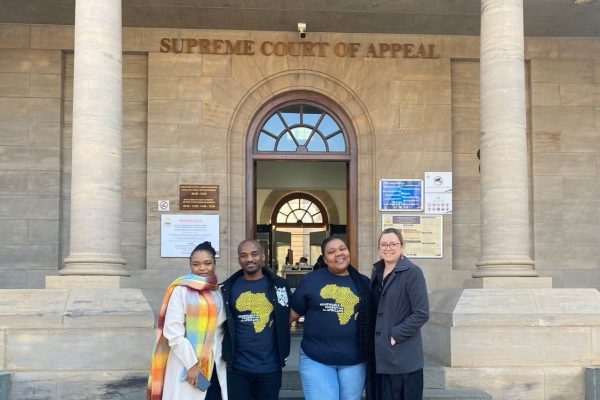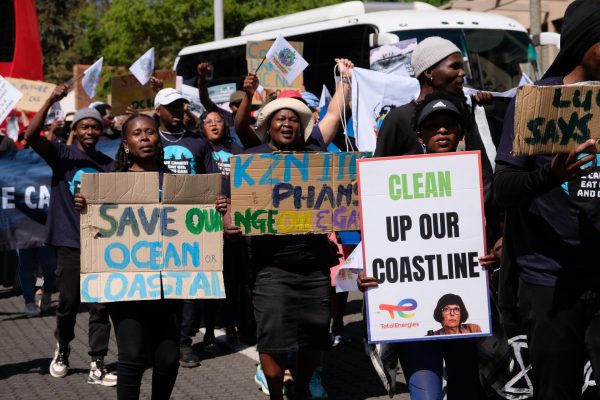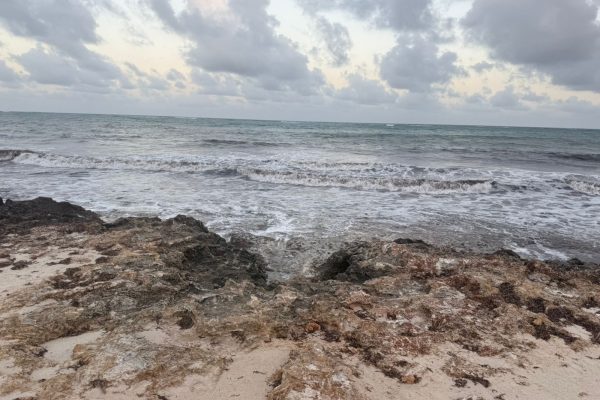On the day South Africa’s anticipated annual budget speech was expected to take place, a group of civil society representatives, including Natural Justice staff, headed to Parliament to address a pressing matter – marine oil pollution.
Presenting before a Parliamentary Portfolio Committee, Natural Justice together with representatives from the Biodiversity Law Centre, BirdLife South Africa, Southern African Foundation for the Preservation of Coastal Birds (SANCCOB) and The Green Connection, gave inputs on the Marine Oil Pollution Bill on Wednesday morning,19 February 2025. The organisations were addressing a select committee on public infrastructure and the minister in the presidency.
The focus of the discussion was the preparedness, response and cooperation section of the Bill and whether it requires further development in order to ensure effectiveness.
Incidences of oil pollution in 2025
Coincidentally, the Portfolio Committee discussion took place merely weeks after an oil spill occurred along the West Coast of South Africa. The spill along the Doringbaai and Strandfontein coastlines was extensively remarked on in the news at the start of the new year due to the extent of the damage (over 40km of coastline), as well as because many beaches were closed to the public.
The impacts of that spill have clearly highlighted the seriousness of the threats of oil spills – not only on marine life and our oceans, but on the livelihoods and wellbeing of the communities who live near the coast.
Furthermore, in January, rescue teams hurried to respond to the oiling of 19 penguins between Hout Bay and Kommetjie in Cape Town – posing a massive threat to the survival of the critically endangered African penguin, a species already on the brink of collapse.
Although it is not known where the oil comes from, the case highlights that there are many species, endangered or not, that can be impacted. Incidentally, the Biodiversity Law Centre is in court to protect the last of the penguins, who are negatively impacted by commercial fishing.
Oil spilling in Parliament
During their joint presentation, the organisations highlighted that the recent West Coast oil spill revealed significant shortcomings in our current marine preparedness legislation – such as the lack of an early warning systems and the lack of community engagement.
They noted that there were insufficient coordination and accountability mechanisms – saying that fragmented communication between government agencies and responders resulted in uncoordinated actions, prolonging environmental damage and worsening socio-economic impacts.
Recommendations to bridge these gaps were presented.
Allan Basajjasubi, Senior Programme Officer for the Affirming Rights programme at Natural Justice told the Committe that:”the MV Ultra Galaxy oil spill of January 26, 2025, exposed critical gaps in our marine preparedness and response framework. Local communities, particularly small-scale fishers, were left uninformed and unprotected, highlighting the urgent need for legislative reform.”
He told the Committee that the new Marine Oil Pollution Bill must mandate comprehensive community engagement, integrate traditional ecological knowledge into response strategies, and establish a transparent compensation fund to support those whose livelihoods are devastated by such disasters.
Traditional Knowledge has a role to play
The Portfolio Committee also heard that local fishers and coastal residents possess invaluable traditional ecological knowledge, honed over generations, about marine ecosystems and the behavior of ocean currents.
This knowledge can significantly enhance early detection and response strategies by pinpointing vulnerable areas and predicting the spill’s movement more accurately.
It was suggested that integrating this wisdom into the legislative framework will not only improve preparedness but also empower communities, fostering a sense of ownership and stewardship over their marine resources.
Allan said: “I urge this Committee to ensure that the new bill mandates community representation in decision-making bodies and establishes mechanisms to systematically incorporate traditional ecological knowledge into preparedness and response plans.”
Polluters must pay
Further recommendations included the establishment of a transparent Compensation Fund – a government-managed compensation fund, monitored by community representatives to ensure accountability and equitable disbursement.
The fund would be accessible to all affected individuals, including small-scale fishers, coastal traders, and marginalized communities whose livelihoods are disproportionately impacted by oil spills – a model that not only guarantees fairness but also enhances public trust in the recovery process.
They called for the enforcement of a “Polluter Pays Principle” to compel corporations responsible for environmental harm to bear the full costs of cleanup, rehabilitation, and provide compensation.
How the Committee responded
The Department of Transport agreed to several important changes suggested by environmental groups including:
Protecting Marine Areas and Wildlife – they said that we needed clearer rules on who is responsible for protecting Marine Protected Areas (MPAs) and who manages oil facilities; and making sure oil spill responses only end when experts confirm the environment has recovered.
Stronger Risk Assessments and Public Participation and Involvement in oil spill assessments – oil spill risk assessments must be done within a year and updated every five years or when new developments happen. The public must have a say in oil spill response planning.
Better Incident Management and Response – a navy representative must be included in the oil spill response teams. Oil spill response meetings will now happen every three months instead of every six. The person in charge of responding to spills must have the authority to quickly approve spending on emergency actions.
They added that the government no longer needs cabinet approval to help neighbouring countries with oil spill emergencies, making responses faster, and that the law now specifically requires having the right equipment to rescue and treat wildlife affected by oil spills.
On holding companies and government accountable, they said that stricter penalties will be enforced for companies that fail to assess risks or prepare response plans for spills. Government agencies can also be held accountable under the law. Companies responsible for oil spills must cover cleanup and compensation costs.
A record from the meeting notes said: “There’s no clear plan yet for handling “mystery spills,” but the fund will still assist with cleanup. If a polluter cannot be found, a government managed fund will help pay for the response, but not for compensation to affected people.”
“This aspect however remains open to discussion with the department in order to figure out the manner in which practically the fund can be administered to assist communities and members of society impacted by oil spills. This remains a key focus for further engagement and discussion with the department.”
What happens next?
The next few days will determine how seriously the South African government, and its parliamentary representatives, will heed the call and note recommendations by civil society organisations and community-based organisations regarding marine pollution.
After the session concluded, the chairperson outlined the next phase in the Bill’s progression. It will now be referred to provincial legislatures to facilitate broader public engagement, ensuring that communities have another opportunity to contribute before it is presented to the National Assembly for approval. The select committee aims to finalize this process by April. Meanwhile, provinces still have the chance to refine and strengthen the Bill, particularly in provisions that shape its implementation at the local level.
Oil spills can occur during dangerous weather conditions and storms, which is ultimately what created the conditions for the MV Ultra Galaxy oil spill. Drilling for oil and gas also increases the chances of oil spills. The immediate impact on marine life can be severe, resulting in poisoning, suffocation and death. The compounded impacts can include loss of livelihoods, swimming and fishing areas and loss of biodiversity. It can take years for these ecosystems to recover. Depending on the type of oil and ocean environment (like wind and current systems), oil can spread far and wide.
Of course, the ocean has no boundaries.
Therefore, we need all voices on board urging government to present the most responsible and effective laws – for the sake of us, but also the countless creatures that rely on our protection.







